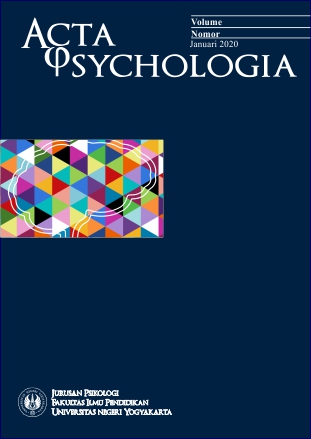Perceived social support sebagai prediktor subjective well-being pada narapidana
DOI:
https://doi.org/10.21831/ap.v7i1.85213Keywords:
narapidana, perceived social support, subjective well-beingAbstract
Dukungan sosial adalah faktor yang secara konsisten dapat meningkatkan kesejahteraan seseorang. Namun, narapidana seringkali menganggap dukungan sosial yang diterima secara negatif yang justru berisiko menurunkan kesejahteraan. Penelitian ini bertujuan untuk membuktikan apakah perceived social support (PSS) dapat memprediksi subjective well-being (SWB) pada narapidana di Lembaga Pemasyarakatan Kelas IIB Sleman. Pendekatan kuantitatif dengan desain survei dilakukan dengan melibatkan 98 narapidana. Instrumen penelitian menggunakan a Brief Form of the Perceived Social Support Questionnaire (F-SozU K-6) adaptasi Indonesia dan the Indonesian Wellbeing Scale (IWS). Data dianalisis dengan regresi linear sederhana melalui software Jamovi 2.3.24. Hasil penelitian membuktikan bahwa PSS secara signifikan dapat memprediksi SWB (F(1, 96) = 6.34, p=.013). Akan tetapi, PSS hanya dapat memprediksi dimensi positive social relation dan tidak pada dimensi lain. Selain itu, intensitas kunjungan keluarga dan residivisme juga berpengaruh tingkat SWB narapidana. Temuan ini mendorong perlunya pengembangan intervensi yang dapat mendukung peningkatan dimensi SWB lainnya di lembaga pemasyarakatan, sehingga kesejahteraan narapidana meningkat secara menyeluruh.
References
Alawiyah, T., & Held, M. L. (2015). Social capital: Promoting health and well-being among indonesian women. Affilia - Journal of Women and Social Work, 30(3), 352–362. https://doi.org/10.1177/0886109915572842
Alidrus, N. D., Syahrina, I. A., & Mariana, R. (2022). Dukungan sosial dan religiusitas dengan psychological well-being pada warga binaan perempuan di lembaga pemasyarakatan. Psyche 165 Journal, 15(2), 105–112. https://doi.org/10.35134/jpsy165.v15i2.174
Andersen, H. S., Sestoft, D., & Gabrielsen, G. (2003). A longitudinal study of prisoners on remand - repeated measures of psychopathology in the initial phase of solitary versus nonsolitary confinement. March 2003. https://doi.org/10.1016/S0160-2527(03)00015-3
Badan Pusat Statistik. (2023). Indikator kesejahteraan rakyat 2023. In Direktorat Analisis dan Pengembangan Statistik (Vol. 52).
Bales, W. D., Nadel, M., Reed, C., & Blomberg, T. G. (2017). Recidivism and inmate mental illness. 40–51.
Blanchflower, D.G. Is happiness U-shaped everywhere? Age and subjective well-being in 145 countries. J Popul Econ 34, 575–624 (2021). https://doi.org/10.1007/s00148-020-00797-z
Bloem, O., Bulten, E., & Verkes, R. (2019). Changes in subjective wellbeing of prisoners on remand. Internasional Journal of Prison Health, 15(2), 181-191. https://doi.org/10.1108/IJPH-01-2018-0003
Boppre, B., Dehart, D., & Shapiro, C. J. (2022). The prison system doesn’t make it comfortable to visit: Prison visitation from the perspectives of people incarcerated and family members. Criminal Justice and Behavior, 49(10), 1–21. https://doi.org/10.1177/0093854822109482
Chassay, L., & Kremer, K. P. (2022). Association between social support and mental health of incarcerated individuals. Journal of Correctional Health Care, 28(1). https://doi.org/https://doi.org/10.1089/jchc.20.01.0003
Claire, K. De, & Dixon, L. (2016). The effects of prison visits from family members on prisoners’ well-being, prison rule breaking, and recidivism : A review of research since 1991. Trauma Violence Abuse, 18(2), 185-199. https://doi.org/10.1177/1524838015603209
Day, J. C., Brauer, J. R., & Butler, H. D. (2015). Coercion and social support behind bars: Testing an integrated theory of misconduct and resistance in U.S. prisons. Criminal Justice and Behavior, 42(2), 133–155. https://doi.org/10.1177/0093854814546352
Desai, D., & Yadav, K. V. (2022). Psychological well-being, resilience and guilt among prisoners and non-prisoners: A comparative study. Indian Journal of Positive Psychology, 13(4), 401–405. https://iahrw.org/our-services/journals/indian-journal-of-positive-psychology/
Diener, E., Lucas, R. E., & Oishi, S. (2018). Advances and open questions in the science of subjective well-being. Collabra: Psychology, 4(1), 1–49. https://doi.org/10.1525/collabra.115
Diener, E., & Scollon, C. (2003). Subjective well-being is desirable, but not the summum bonum. Paper presented at the Workshop on Well-Being, Minneapolis, MN, USA.
Edgemon, T. G., & Clay-Warner, J. (2019). Inmate mental health and the pains of imprisonment. Society and Mental Health, 9(1), 33–50. https://doi.org/10.1177/2156869318785424
Fazel, S., Hayes, A. J., Bartellas, K., Clerici, M., & Trestman, R. (2016). Mental health of prisoners: prevalence, adverse outcomes, and interventions. In The Lancet Psychiatry (Vol. 3, Issue 9, pp. 871–881). Elsevier Ltd. https://doi.org/10.1016/S2215-0366(16)30142-0
Feeney, B. C., & Collins, N. L. (2014). A theoretical perspective on the importance of social connections for thriving. In M. Mikulincer & P. R. Shaver (Eds.), Mechanisms of social connection: From brain to group (pp. 291–314). American Psychological Association. https://doi.org/10.1037/14250-017
Fydrich, T., Geyer, M., Hessel, A., Sommer, G., & Brähler, E. (1999). Fragebogen zur Sozialen Unterstützung (F-SozU) : Norm ierung an einer repräsentativen Stichprobe. 45(4), 212–216. https://doi.org/10.1026/0012-1924.45.4.212
Harandi, T. F., Taghinasab, M. M., & Nayeri, T. D. (2017). The correlation of social support with mental health: A meta-analysis. Electronic Physician, 9(9), 5212–5222. https://doi.org/10.19082/5212
Harding, T., & Zimmermann, E. (1989). Psychiatric symptoms, cognitive stress and vulnerability factors: A study in a remand prison. British Journal of Psychiatry, 155, 36–43. https://doi.org/10.1192/bjp.155.1.36
Kjellstrand, J., Eddy, J. M., Caffery, C., & Smith, J. (2021). Reentering the community after prison : Perspectives on the role and importance of social support. American Journal of Criminal Justice, 47(2), 176-201. https://doi.org/10.1007/s12103-020-09596-4
Kliem, S., M€oßle, T., Rehbein, F., Hellmann, D. F., Zenger, M., Thomas, M., & Br, E. (2015). A brief form of the Perceived Social Support Questionnaire (F-SozU) was developed, validated, and standardized. J Cline Epidemiol, 68(5), 551-62. https://doi.org/10.1016/j.jclinepi.2014.11.003
Kyprianides, A., & Easterbrook, M. J. (2020). Social factors boost well-being behind bars: The importance of individual and group ties for prisoner well-being. Applied Psychology: Health and Well-Being, 12(1), 7–29. https://doi.org/10.1111/aphw.12171
Liebling, A., & Ludlow, A. (2016). Suicide, distress and the quality of prison life in Handbook on Prisons. Routledge.
Mandhouj, O., Aubin, H., Amirouche, A., Perroud, N. A., & Huguelet, P. (2014). Spirituality and religion among french prisoners : An effective coping resource?. Internasional Journal of Offencer Therapy and Comparative Criminology, 58(7), 821-834. https://doi.org/10.1177/0306624X13491715
Maulana, H., Obst, P., & Khawaja, N. (2018). Indonesian perspective of wellbeing: A qualitative study. The Qualitative Report, 23(12), 3136-3152. Retrieved from https://nsuworks.nova.edu/tqr/vol23/iss12/18
Maulana, H., Khawaja, N., & Obst, P. (2019). Development and validation of the Indonesian Well-being Scale. Asian Journal of Social Psychology, 22(3), 268–280. https://doi.org/10.1111/ajsp.12366
Mitchell, M. M., Spooner, K., Jia, D., & Zhang, Y. (2016). The effect of prison visitation on reentry success : A meta-analysis. Journal of Criminal Justice, 47, 74–83. https://doi.org/10.1016/j.jcrimjus.2016.07.006
Mo, Z., Wu, X., Yue, C., & Wu, J. (2020). Inpatient prisoners : Symptom Checklist-90 measurement and social support’s impact on mental health. International Journal of Clinical and Experimental Medicine, 13(9), 6695–6702.
Naor, L., & Mayseless, O. (2020). The wilderness solo experience : A unique practice of silence and solitude for personal growth. 11(September), 1–15. https://doi.org/10.3389/fpsyg.2020.547067
Noll, T. (2015). Prison Violence. International Journal of Offender Therapy and Comparative Criminology, 59(4), 335-336. https://doi.org/10.1177/0306624X15573246
Pew Research Center. (2024, August 9). Where is the most religious place in the world? Pew Research Center. https://www.pewresearch.org/short-reads/2024/08/09/where-is-the-most-religious-place-in-the-world/
Richie, F., Bonner, J., Wittenborn, A., Weinstock, L. M., Zlotnick, C., Johnson, J., Richie, F., Bonner, J., Wittenborn, A., & Lauren, M. (2019). Social support and suicidal ideation among prisoners with major depressive disorder. Archives of Suicide Research, 25(1), 107-114. https://doi.org/10.1080/13811118.2019.1649773
Sujarwoto, S., & Tampubolon, G. (2017). Individual and contextual factors of happiness and life satisfaction in a low middle income country. Applied Research Quality Life. https://doi.org/10.1007/s11482-017-9567-y
Tan, J. J. X., Kraus, M. W., Carpenter, N. C., & Adler, N. E. (2020). The association between objective and subjective socioeconomic status and subjective well-being: A meta-analytic review. Psychological Bulletin, 146(11), 970–1020. https://doi.org/10.1037/bul0000258
Tasca, M., Mulvey, P., & Rodriguez, N. (2016). Families coming together in prison: An examination of visitation encounters. Punishment and Society, 18(14), 459-478. https://doi.org/10.1177/1462474516642856
Torkaman, M., Farokhzadian, J., & Miri, S. (2020). The effect of transactional analysis on the self-esteem of imprisoned women : a clinical trial. BMC Psychol, 8(3), 1–7. https://doi.org/10.1186/s40359-019-0369-x
Triandis, H. C. (2015). Collectivism and individualism : Cultural and psychological concerns. In International Encyclopedia of Social & Behavioral Sciences (Second Edi, Vol. 4, Issue 1762). Elsevier. https://doi.org/10.1016/B978-0-08-097086-8.24008-7
Turanovic, J. J., & Tasca, M. (2019). Inmates’ experiences with prison visitation. Justice Quarterly, 36(2), 287–322. https://doi.org/10.1080/07418825.2017.1385826
Valdebenito, V., Benjumeda, I., Hadler, V., & Guzmán, S. (2024). The high costs of freedom: subjective well-being and mental health in prisoners in Chile. International Journal of Prison Health, 20(4), 434–449. https://doi.org/10.1108/IJOPH-12-2023-0087
Vanhooren, S., Leijssen, M., & Dezutter, J. (2017). Ten prisoners on a search for meaning: A qualitative study of loss and growth during incarceration. Humanistic Psychologist, 45(2), 162–178. https://doi.org/10.1037/hum0000055
Wahyudi, A., Istihapsari, V., Supriyanto, A., Partini Suardiman, S., Jepri Kurniawan, S., Ilmu Pendidikan, F., & Ahmad Dahlan, U. (2021). Analisis model RASCH pada adaptasi skala a Brief Form of The Percieved Social Support Questionnaire (F-SoZu) versi bahasa Indonesia. Jurnal Fokus Konseling, 7(1), 33–41. https://doi.org/10.26638/jfk.v10i1.2276
Downloads
Published
How to Cite
Issue
Section
License
Copyright (c) 2025 Faradella Buraira Ryandhita Wicaksono, Nesya Adira

This work is licensed under a Creative Commons Attribution-ShareAlike 4.0 International License.
Acta Psychologia allows readers to read, download, copy, distribute, print, search, or link to its articles' full texts and allows readers to use them for any other lawful purpose. The journal allows the author(s) to hold the copyright without restrictions. Finally, the journal allows the author(s) to retain publishing rights without restrictions
- Authors are allowed to archive their submitted article in an open access repository
- Authors are allowed to archive the final published article in an open access repository with an acknowledgment of its initial publication in this journal

This work is licensed under a Creative Commons Attribution-ShareAlike 4.0 Generic License.










